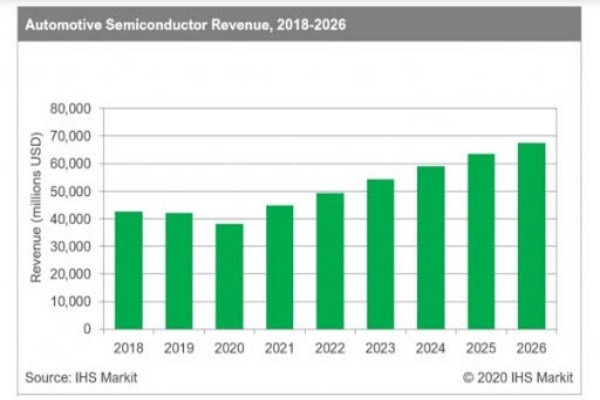Top automotive semiconductor manufacturers have all witnessed their performance rise in the first quarter due to a severe short supply of automotive semiconductors and a rise in automotive semiconductor prices. It is expected that the issue of short supply will not be resolved by end of this year as orders for some automotive semiconductors are backed up by 18 months. As a result, this upward trend in their performance is likely to continue for a while.
According to the industry on Wednesday, NXP from Netherlands, Infineon Technologies from Germany, STMicroelectronics from Switzerland, Renasas from Japan, and Texas Instruments from the United States have all witnessed their performance rise in the first quarter.
Infineon made about $1.5 billion (1.6466 trillion KRW) in sales from automotive semiconductors and had its first quarter performance improve by 45% compared to the first quarter last year. While its operating profit rate was 5.8% last year, its profit rate in this first quarter increased by more than 10% and reached 16.2%.
Renasas recorded $940 million (1.0584 trillion KRW) in sales which is more than 10% of what it made last year. Its operating profit was $210 million (22.8 billion yen) and it increased by 58.3% compared to last year.
NXP’s sales from automotive semiconductors jumped 24% from $994 million last year to $1.229 billion this year. Sales from automotive semiconductors take up about 50% of the company’s entire sales.
Texas Instruments recorded an operating profit of $1.939 billion KRW which is a 56% increase compared to last year. Although the company did not announce its sales from automotive semiconductors, it can be assumed that the company’s automotive semiconductor business was a major factor for the company’s positive performance in the first quarter. Texas Instruments stated that the company’s automotive semiconductor shipments in the fourth quarter last year and this first quarter increased by 25% compared to the fourth quarter of 2019.

An unprecedented short supply is the reason behind positive performance by these automotive semiconductor manufacturers. While demands for cars had been low early last year when the world was just hit with the COVID-19 pandemic, manufacturing lines from automakers all of sudden started to be very busy at the end of last year and has caused a great shortage of related materials and parts. Development of electric vehicle and autonomous driving technologies in particular has caused a great increase in demands for high-performance automotive semiconductors such as 32-bit microcontroller units (MCU). Also, the fact that most of automotive semiconductors are manufactured from 8-inch foundry lines that are already suffering from a short supply issue is also a problem.
These companies take up about 80% of the global automotive semiconductor market.
Semiconductor companies believe that the current short supply issue of automotive semiconductors will not be easily resolved until the second half this year. Although TSMC, which recently faced a power outage at its automotive semiconductor production line, announced that it would increase number of related processes, it seems that a bottleneck phenomenon that has been delayed up to one year will not be easily resolved.
STMicroelectronics said that demands easily exceed its production capability and that orders for automotive semiconductors are backed up by about 18 months.
As a result, it is expected that these automotive semiconductor manufacturers will continue to see their performance increase as long as there are great demands for automotive semiconductors.
NXP said that it predicts that its sales from automotive semiconductors in the second quarter will be about 80% higher than what it made in the second quarter last year.
Staff Reporter Kang, Hyeryung | kang@etnews.com